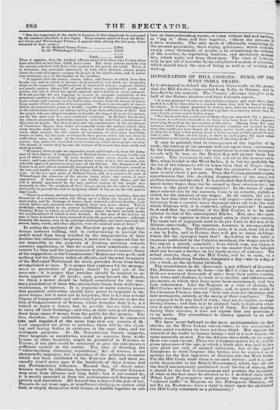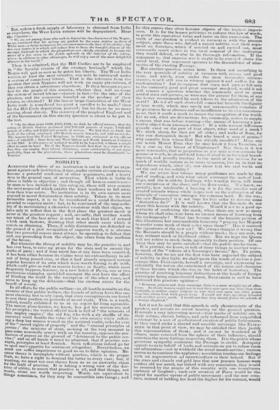DEPORTATION OF HILL COOLIES : PERIL OF THE WEST INDIA
TRADE.
IT its attempted to defend the Eastern Slave-trade on the gnan! that the Hill Coolies, transported from India to Guiana, will be benefited by the removal. The Courier advances this ples in be. half of the Guiana planters and their Calcutta agents.
" it is not proposed to seize on poor helpless savages, and send them closely peeked in a filthy elave-ship to a country where they will be forced to labon for others. It is simply proposed to convey men, who are starving on wage' scarcely sufficient to keep lady and soul together, to a country where they wifl immediately receive nmeh higher wages.
" For the benefit thus conferred on them, they are expected, for a perind or five years, to ind-nture themselves to those who have been at the expense
conveying them from the arm country to the other. During those five yeses, however, moult higher wsges and touch greater comforts ale secured to them than they could ever have hoped titr in their native land ; and, if they desire it, they are to have a free passage back to India as soon as their period ;if semi. tude is over. Where. we ask again. is there in Ruda a plan the most remote reeemblance to the justly execrated-horrors of the slave-trade ?"
It may be granted, that in consequence of the legality of The trade, the horrors of time passage will not equal those encountered by the kidnapped Africans: the temptation to cram the transport. vessels will he less, as the British flag will protect them from seizure. The insurarce is only 12.9. a had on the human cattle. But, when landed in the West Indies, it is but too probable filet the lot of the labourers will be worse I hen that of Negro slaves. In the first place, we have seen that the proportion of women to men is only about 3 per cent. Even the Guiona journals express apprehension that this shocking disproportion of the sexes will produce misery and mischief. It is pretended that Indians will have much better wages than can be earned in their own country ; but where is the proof of that assutnption ? In the terms of agree. ment entered into by the masters, there is no security, rightly so called, for the payment of any wages. At all events, the pay is to be less than that which Negroes will require—else why import labourers from a country many thousand mites off, to do the work which Negroes will, it is expected, refuse to perform? It cannot be denied that the condition of the Hill Coolies is to be made inferior to that of the emancipated Blacks. Bnt, says the apolce gist, it will be superior to their actual state in their own country. The same sort of argument used to be put forth in defence of the African slave-trade. The assertion, however, is unsupported by the known facts. The Hill Coolies earn, it is said, from 2d. to 3d. a (lay in India, and in Guiana they will get as many shillings: where did time apologist learn that ? According to the table of expenses published by the Calcutta merchant, the wages are to be five rupees a month, nominally ; from which sum, one rupee, or 2s., is to be deducted as a security to the master that the labourer shall not become a burden on his hands in case of sickness. The actual receipts, then, of the Hill Cooly, will be in cash, Sc. t month; or, deducting Sundays, fourpence a day—not 3s. a day, or 18s. a week, as the apologist pretends. Time resemblance to the slave-trade is not difficult of discovery. The Africans are taken by force—the Hill Coolies by stratagem. Both are conveyed thousands of miles from their native country, their wives and children, to work at to:healthy and laborious em- ployments, to which they have never been accustomed, and fore bare subsistence. Like the Negroes in a state of slavery, the Hill Coolies will have no civil rights; and, to quote the words of Sir Cu ARLES FORBES, they are "to be left, even for obtaining oh* lute necessaries, entirely at the mercy of their employers." They are engaged to do any kind of work; they are to receive no wages
during ; and they may be shipped back to Calcutta when ever it suits their masters to get rid of them. For their families, during their absence, it does not appear that any provision is to be made. The resemblance to slavery appears to us suffi- ciently strong.
We have never hallooed on the mere sentimentalists in their attacks on the West Indian slaveholders; to the necessities of whose social condition we have not been blind. But against this renewal of the traffic in human beings—and in a new region—We must earnestly protest. For the African slave-trade, in its origin, there was some excuse. There was a humane motive for it ; and the gross ignorance of the age, in which a black skin was held to bet sure proof not only of' natural inferiority, but of the right of Europeans to treat Negroes like brutes, may be received as an apology for the first importers of Africans into the %Vest Indies For the Hill Cooly trade there is no such excuse : and it is espe- cially disgraceful to the British Government, which has all over the world ostentatiously proclaimed itself the foe of slavery, that it should be the first to countenance and promote the institution of what at the best must be allowed to be a modified slave trade. When Lord PALMERSTON next presses the suppression Of the "infernal traffic" in Negroes on the Portuguese Ministry, svill not SA DA BANDETRv have a right to insist upon the abolition of the Hin Cooly commerce as a prelimivary ? rut, unless a fresh supply of labourers is obtained from India or elsewhere, the West India estates will be depopulated. Hear the Courier— We are ant among those who seek to depreciate the character of the Negro: we are convinced that his action are guided by the same motive as those of White men—a desire to improve his eireninstanees to the best of his ability; hat this very motive it is which will induce .hun leant! the baneful climate of the swampy lowlands in which the plantations are in :situated, to become the owner .nf a few ncres in the fertile uplands In the Interior of the colony. where. of addition to other advantages, he will enjoy one of the most delightful
climates in the world."
'then it is admitted, that the Hill Coolies are to be employed in " the baneful climate of the swampy lowlands" which the Negro will quit as soon as he gains his liberty. The West India estates, at least the most valuable, can only be cultivated under a at stem of compulsory labour. That is the inference from the position that even Negroes will not work on sugar plantations, if they can obtain a subsistence elsewhere. It then becomes a ques- tion for the people of this country, whether they will cootinue the system of forced labour—slavery in fact—for the sake of the planters, and the commerce founded on the produce of their estates, so obtained? If the loss or large diminution of the West India trade is considered too great a sacrifice to be made,* then let the Hill Cooly deportation proceed; but let there be no more
and canting about slavery. The sincerity of the people of England a el' the Government on this slavery question is about to be put to the test.
• In the three years 18'29, 1830,1831, we find, by official returns. that the colony of British Guiana piodueed ..2(i.2.709559 pounds of sugar. 7.050,401
pounds of coffee, and Jul11 rids of cotton. We find that, in 1832. the trade of the colony employee em lii itish vessels inwat ds, and 540 out wards The imports from the United Kingdom, IMO, are estimated at the offiek:1 valre of 542,107/. ; those Irma our West Indian awl North Americas Colonies at 140.796/. Is this sourer of nationil wealth to be haztrded, without a single effort to avert its loss? Yet if the Negroes should flint that in a state of f;'re- dom they can employ their labour elsewhele, mute satisfactorily, if not mote profitably, than on the plantatious, those plantations must be abandoned."— Courier.



























 Previous page
Previous page